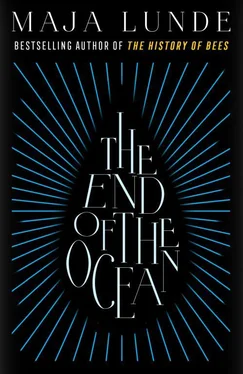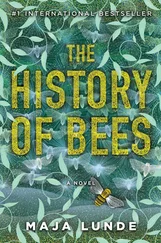But the young people don’t think about my being old, because they don’t even see me. That’s how it is, nobody sees old ladies. It has been many years since somebody looked at me. They just laugh youthfully and openly and talk about a history quiz they’ve just taken, the Cold War, the Berlin Wall, but not about the subject matter, just about what grades they got. And nobody mentions the ice, not a word about the ice, about the glacier, even though it should be what everyone is talking about here at home.
Here at home… do I really still call it home? I can’t fathom it, after having been away for almost forty years, no, soon fifty years. I came home only to clean up after a death in the family, to grieve the compulsory five days after the funerals—first my mother’s, then my father’s. A total of ten days is all the time I have spent here during all these years. I have two brothers here, half-brothers, but I hardly ever speak with them. They are my mother’s boys.
I lean my head against the bus window, look at the changes. The area is more built-up, the buildings closer together, a new construction project consisting of white prefabricated houses with small windowpanes clings tenaciously to the hillside. The bus passes the indoor swimming pool; it has a new roof and there is a big blue sign at the entrance: Ringfjord Water Fun. Everything sounds better in English.
The bus climbs upwards, inland. A couple of the young people get off at the construction site at the top, but most of them remain seated. We ascend, the road changes, narrows, becomes full of potholes, at almost the exact same time as we drive into the neighboring municipality. This is where most of the young people get off. Apparently they still don’t have a high school out here, still don’t have an indoor swimming pool, here in the town of Eidesdalen, the little brother, the loser.
I get off with the last of the young people, stroll slowly through the center of the village. It is even smaller than I remembered. The general store has been shut down. While Ringfjorden has grown, Eide is a fraction of its original size… but it’s not for Eide’s sake that I have come today, I can’t cry for Eidesdalen anymore—that battle is over, it ended many, many years ago. It is now the ice that has brought me here, Blåfonna, and I take the dirt road leading to the mountain.
Even the national newspapers write about it, I have read the articles again and again, and can hardly believe the words. They are extracting ice from the glacier—pure, white ice from Norway—and marketing it as the most exclusive ingredient, to be put in a drink, a floating mini-iceberg, surrounded by golden liquor, but not for Norwegian customers, no, for those who have really deep pockets; the ice is to be shipped to desert nations, the homes of oil sheiks, and there it will be sold as if it were gold, white gold, to the wealthiest of the wealthy.
It starts snowing, winter’s final spasm, April’s way of thumbing its nose, as I climb towards the mountain. There are little pools of frozen water on the road, rimmed with crystals. I put my foot down against the thin surface ice covering a small puddle, shatter it, hear it break, but it’s no fun any longer, not the way it once was.
I grow short of breath. It’s steep and further than I remembered.
But I finally reach it, finally I see the glacier. Dear, dear Blåfonna.
All glaciers melt, I know that, but nonetheless it’s something else witnessing it. I stop, just breathe; the ice is still there, but not where it used to be. When I was a little girl, I walked from the edge of the glacier almost all the way to the mountain cliff where the waterfalls disappeared below, where the glacier and the waterfalls were connected. But now the glacier is located high up on the mountainside. It’s a long way, a hundred meters perhaps, between the cliff and the blue tongue. The glacier has moved, as if trying to escape, get away from humans.
I continue climbing through the heather. I have to feel it, have to walk on it, touch it again.
Finally I have ice under my feet; every step makes noise, a slight crunching sound. I keep going, and now I can see the extraction area, the gouges in the grayish-white glacier, and deep gashes in the blue interior where the ice has been cut away. Beside it there are four large white bags that are full, ready for pick-up. They use chainsaws, I’ve read, chainsaws that are not lubricated, so the pieces of ice won’t be sullied by oil.
Nothing should surprise me anymore, all the things human beings do. But this, this nonetheless tears something open inside of me, because Magnus must have sat at a board meeting and smilingly approved this, maybe even applauded it.
I walk closer. I have to climb to come right up against it, as the gouges were made where the glacier is the steepest. I take off one mitten, place my hand against the ice; it is alive beneath my fingers—my glacier, a huge, calm animal that sleeps—but it is a wounded animal, and it can’t roar, it is being drained minute by minute, second by second, it is already dying.
Too old to cry, too old for these tears, but nonetheless my cheeks are damp.
Our ice, Magnus, our ice.
Have you forgotten about it, or did you perhaps not even notice it, that the first time we met, it was with melting ice from Blåfonna in our hands?
I was seven, you were eight, do you remember? It was my birthday and I was given a present of water, frozen water.
*
All of life is water, all of life was water, everywhere I turned there was water. It gushed from the sky as rain or snow, it filled the small lakes in the mountains, lay in the form of ice in the glacier, it flowed down the steep mountainsides in thousands of small streams, accumulated into the River Breio, formed a flat surface in front of the village in the fjord, the fjord which became the ocean when you followed it west. My whole world was water. The ground, the mountains, the pastures were just teeny tiny islands in that which actually was the world and I called my world Earth, but thought that it should actually be named Water.
The summer was so hot, as if we lived somewhere else entirely, the heat didn’t belong here and the English tourists staying at our hotel, how they sweated, sitting outside in the big garden under the fruit trees, fanning themselves with old newspapers. They said that they never imagined that it could be so hot here up north.
When I awoke, the bed was empty, Mommy and Daddy were already up. I used to sleep between them; during the night I tiptoed into their room and lay down in the middle of the double bed. They asked if I’d been dreaming, but that wasn’t why.
“I don’t want to be alone,” I said. “I want to be with somebody.”
They must certainly understand that; they slept here with somebody every single night, but regardless of how many times I came in, they didn’t understand. Every single evening when I went to bed, they reminded me that I had to sleep in my own bed, all night, not just half the night. I said that I would, because I understood that was what they wanted me to say, but then I woke up anyway. Every night I sat up and felt how empty the bed was, how empty the room was, and then I tiptoed in, no, I didn’t tiptoe, young children are no good at tiptoeing and especially not me. I just walked, without thinking about how I was making noise, without worrying about waking them. I walked across the cold floorboards, into their room where I always climbed in from the foot of the bed, because then I could push my way down in between them without having to crawl across either of their big bodies. I never needed a duvet, because their bodies, on either side of my own, were warm enough.
But on precisely this morning I was lying in bed alone, they were up, but because it was my birthday, I couldn’t get up to join them. I knew I had to lie there quietly, I remembered it from last year, that on your birthday you’re supposed to lie still and wait for them to come, and the itchiness, I can still remember the itchiness, how it erupted in my arms and feet, the unbearable waiting, that it was almost not to be borne, that perhaps it would even have been better not to have a birthday at all.
Читать дальше










